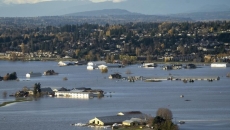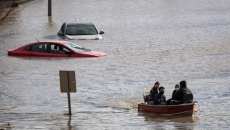As several provinces toy with scrapping their COVID-19 vaccine mandates, medical experts allow it may be time to start reconsidering the policy but caution against dropping the measure too soon.
Prevalence of cases among both vaccinated and unvaccinated Canadians has led to calls to nix the vaccine passport system by some who question whether the shots make a difference in transmission.
However, Dr. Fahad Razak, an epidemiologist and health policy expert with the University of Toronto, said discarding the policy while hospitalizations are just starting to ease in parts of the country is "premature."
He suggested a "buffer" of several weeks before tossing vaccine passports to help ensure the Omicron variant doesn't cause another rapid spike that could overwhelm a health-care system still precariously dealing with elevated hospital and intensive care admissions, cancelled surgeries and staffing shortages.
"There may be a future time where relaxation is reasonable but ... we're not exactly sure what will happen when you change these policies," Razak said, adding that Ontario is currently seeing peak levels of daily COVID-19 deaths.
"Do it at a time when there is capacity for the system to respond appropriately if there is a rise in cases."
Ontario's top doctor Kieran Moore said Thursday the province needs to "reassess the value" of its vaccine passport system, noting two doses no longer seem to significantly limit the spread of Omicron.
Saskatchewan Premier Scott Moe said earlier this week the vaccination requirement there had "run its course" while Alberta Premier Jason Kenney is expected to announce a firm date next week to scrap his province's passport system, a move he said is likely to happen in the "very near future."
Razak said vaccine passports were implemented with two main goals: to prevent transmission and to keep people out of hospital.
Canada's National Advisory Committee on Immunization has said two doses of mRNA vaccines offer 75 to 80 per cent protection against severe Omicron disease, and a third dose increases that further.
Vaccinated people remain less likely to spread the virus to others because they're less likely to become sick in the first place, experts say. But if protection against infection with two doses has waned substantially, some could argue the two-jab passport does little to stop spread.
Preliminary, pre-print data from Ontario suggests vaccines lose substantial effectiveness against infection from Omicron — dropping from 36 per cent two months after a second dose to zero four months later — but protection increased to more than 60 per cent with a booster. The paper also notes that protection against severe Omicron disease jumps to 95 per cent seven days after a third dose.
Dr. Jeff Kwong, a co-author of the study and an epidemiologist with Public Health Ontario and the Institute for Clinical Evaluation Sciences (ICES), said the findings mirror research from other scientists, but PCR testing limitations made it more difficult for his team to properly evaluate vaccine effectiveness.
Kwong said vaccines are still likely to "reduce transmission, but they can't eliminate (it)."
"If you have 20,000 (vaccinated) people in an arena, even if there's reduced transmission, there still could be significant numbers of transmission events," he said.
The study has not been peer reviewed, but Razak said the findings add to ongoing debate over whether three doses should be the standard for vaccine certificates.
He said that could be "a reasonable way forward," given the third dose's boost in preventing both infection and serious outcomes.
"But people could also say that if they have protection against severe disease (with two doses), should they be compelled to take a third dose to prevent mild illness?" he asked. "I think that is a reasonable question.... It's just not as clear."
Dr. Theresa Tam, Canada's chief public officer of health, said in a news conference Friday she's actively discussing "a whole range of public health measures," including vaccine mandates, with provincial and territorial medical officers.
She said any changes would come from provinces and territories, which know their own epidemiological situations.
"I think what we do need to do going forward as we emerge (from) the Omicron wave is to recognize that this virus is not going to disappear.... We do need to have more longer-term sustained approaches and capacity-building so that we're not in crisis mode all the time as we fight this virus," Tam said.
She added that vaccines remain "extremely important" in reducing serious disease, even though the protection they provide against Omicron infection has decreased.
Dr. Howard Njoo, Canada's deputy chief public health officer, said Friday that booster doses work well to "decrease your risk of infection which in turn, reduce the likelihood of spreading the virus to others."
He added that timing will be an important consideration as provinces start relaxing restrictions.
"Everyone wants public health measures to be loosened, but we've seen with previous waves that there is a balance that needs to be struck," he said. "If you do away with public health measures too quickly, then there's always the risk of creating more hospitalizations, more potential deaths ...
"It's difficult to predict what will happen if we loosen some of the rules at this point."






